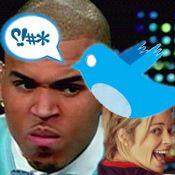Cognition
Celebrity @#!! On Twitter
Chris Brown is just another example of tweeting before thinking
Posted November 28, 2012
Some celebrities are masters at using Twitter to build a fan base. Others, like Chris Brown, suffer from not understanding the potential impact of failing to think first, tweet second.
Social media give celebrities great platforms for building a fan base. They have wide distribution as messages move across networks. Twitter, with its 140-character frequent and casual blasts, aren’t perceived as mediated by celebrity ‘handlers,’ and tweet can feel authentic and personal to fans. Personal contact and disclosure increases the sense of attachment a fan feels to a celebrity. Based on some of the content flowing across Twitter, the fans’ perception that they getting messages direct from the celebrities is not misplaced. In fact, many celebrities make a point of establishing this means of direct contact with their fans and do so very effectively. Think Lady Gaga, Ashton Kuchner or Justin Bieber. It’s also pretty clear that a celebs is doing their own tweeting when no publicist would release some of the tweets we see, from the downward spiral of Charlie Sheen, the racist remarks of the Greek Olympic athlete or, most recently, Chris Brown and his recent off-color exchange with comedian Jenny Johnson.

Computer mediated communications like Twitter can provide a sense of anonymity that, on the one hand, creates opportunities for identity exploration and meaningful connection through personal disclosure and social validation. Individuals who feel marginalized or socially shy can find the perception of distance very freeing and positive.
For others, the disinhibition takes a less positive route, and an individual may say things they wouldn’t (and shouldn’t) in public. When someone who Tweets also has trouble with impulse control in general, we end up with things we’d just as soon not see.
Combine this with people whose careers are fueled by their celebrity and keeping their name in the spotlight and you get a difficult balancing act even for the most conscientious among them. This can be further complicated when celebrity brings a sense of entitlement and being above standard social rules and norms. It’s hard to remember that you are a mere mortal or even get honest feedback when you’re surrounded by an entourage of sycophants, fans, and employees—all of whom are getting something from making you like them in one way or another.
When we broadcast messages on social media networks, such as Twitter, we may not consciously about who we’re sending our message to, but we all have some sense of who we're talking to, colleagues, family, friends, and/or fans. In the case of celebrities, they may be imagining their fans and feel pressure to maintain a social front of coolness and hipness. It’s also possible to lose site of the audience, such as engaged in a heated exchange of one-upsmanship, such as the to- and froing of Brown and Johnson. It’s easy to redefine the imagined audience as the target of your wrath and get a sort of tunnel vision without considering the ramifications of the broader audience and their perceptions. Was Brown more concerned with putting down Johnson than with maintaining his image, or did protecting his image involved vulgarly putting down Johnson? What was her motive in egging him on? Without knowing Brown or Johnson, who’s to know? We do know, however, that impulse control may not be one of Brown’s signature strengths based on the accusations of physical abuse toward girlfriend Rihanna. We often hear bad publicity is better than no publicity at all. If that’s the strategy for Brown, he did a great job.
Celebrity or not, there are things to remember about social media in general and Twitter in particular.
- Twitter is a network, not a broadcast medium. Our mental models are based on traditional communications, not network theory. Information ripples out with the potential for much more reach than most of us remember.
- Twitter is permanent and searchable. Even if you delete your account, as Brown did, the communications live on in retweets and on Johnson’s feed.
- What someone ‘hears’ online may not be what you mean to say. Written communications like Tweets lack context—in the case of Tweets, they are often seen without even rest of the Twitter thread. Someone has to be following all the conversation participants (and pay attention) to see the whole conversation. Even then, much of the intended meaning can be lost or misconstrued. Communication nuances, like sarcasm, voice tone, or even deadpan humor, can be completely missed and misinterpreted, even with an emoticon.
- Things that are funny spoken, aren’t always funny written. Vulgar words in particular look much harsher and meaner. The relative infrequency of seeing such words make them stand out. Shock value is, of course, the whole point of expletives, but a little goes a long way.
- Positive messaging changes our neural chemistry, triggering reward sensations and creating positive feelings. The same happens on the other side. Negative messaging changes our neural chemistry creating negative feelings and associations. We are all happy to embrace positive feelings. To handle negative feelings, however, we self-protect by projecting it back on the sender. Think karma. The net result of slinging mud, as the schoolyard taunt goes: “Everything you say bounces off me and sticks on you.”


